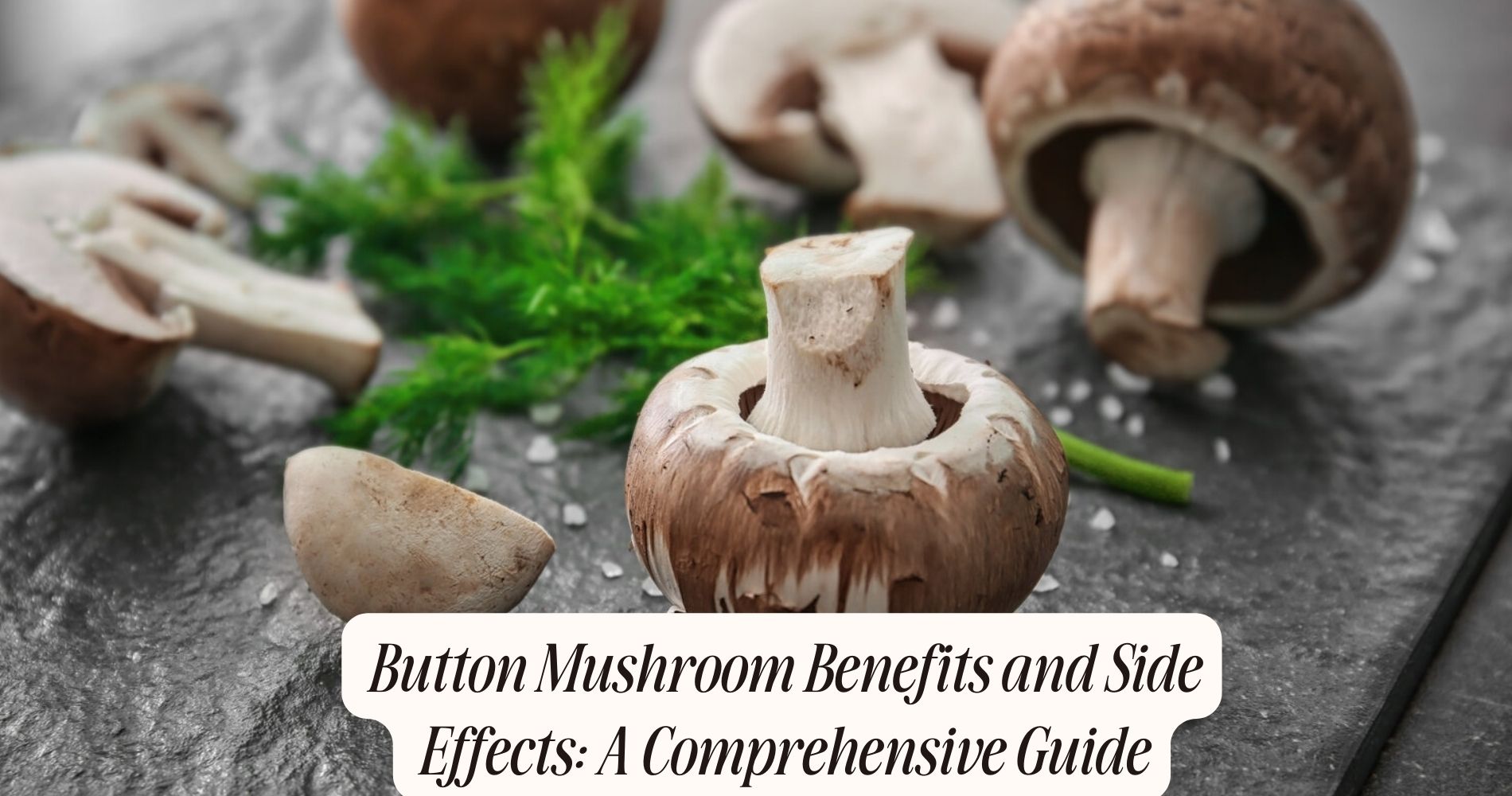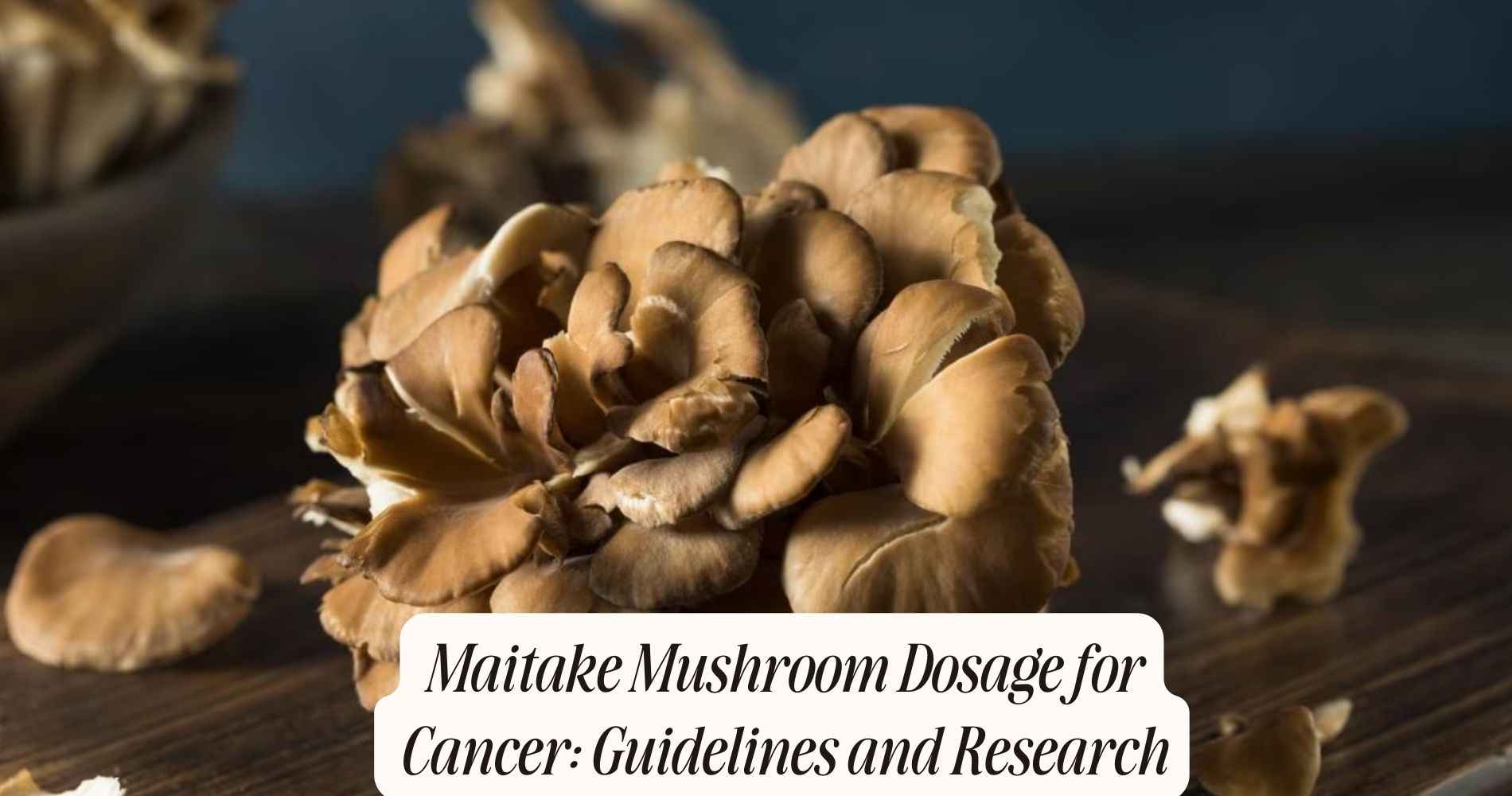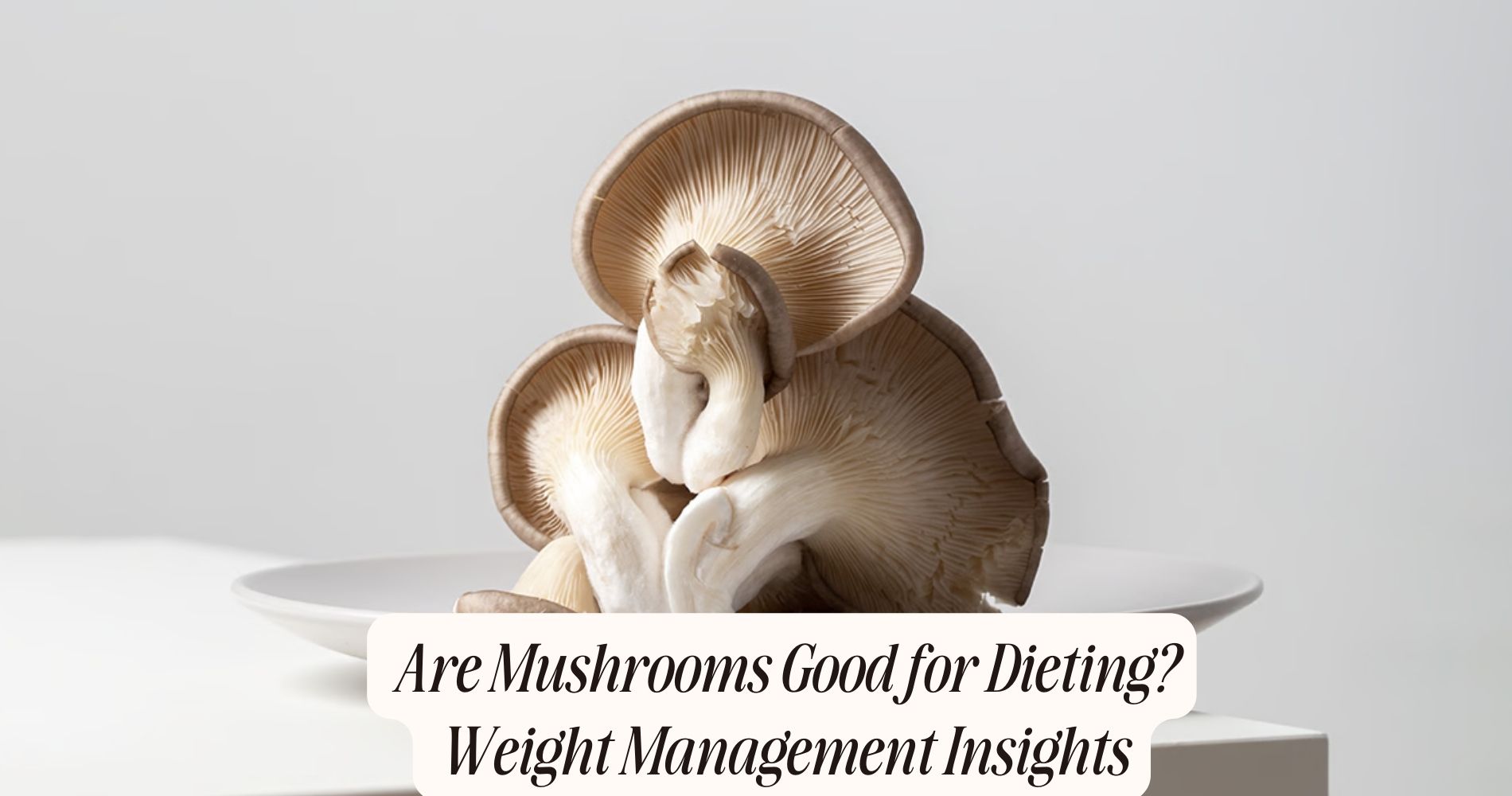
Button Mushroom Benefits and Side Effects: A Comprehensive Guide
Nutritional Profile
When you look at the nutritional profile of button mushrooms, you'll find they're a low-calorie source rich in essential vitamins and minerals. On average, a cup of raw button mushrooms contains just 15 calories. Despite their low-calorie count, they pack a significant nutritional punch.
Button mushrooms have a notable fiber content, contributing about 1 gram per cup. This fiber aids in digestion and helps maintain a healthy gut. Additionally, these mushrooms provide a modest amount of protein. One cup offers around 2 grams of protein, which can contribute to your daily intake, especially if you're looking for plant-based sources.

Beyond fiber and protein, button mushrooms are also rich in several vitamins and minerals. They provide substantial amounts of B vitamins, such as riboflavin, niacin, and pantothenic acid, essential for energy production and overall cell function.
Furthermore, they contain important minerals like selenium, copper, and potassium, which support various bodily functions, including immune response and heart health.
Health Benefits
Building on their impressive nutritional profile, button mushrooms offer a range of health benefits that can enhance your overall well-being. One key advantage is their potential role in cancer prevention. Research indicates that button mushrooms contain bioactive compounds like polysaccharides and antioxidants that may inhibit the growth of cancer cells. These compounds can neutralize free radicals, reducing oxidative stress and, consequently, lowering the risk of various cancers.
Button mushrooms also contribute notably to heart health. They're a good source of potassium, a mineral that helps regulate blood pressure by balancing sodium levels in your body. Additionally, they contain dietary fiber, which aids in lowering cholesterol levels. Lower cholesterol leads to a reduced risk of heart disease, making button mushrooms a heart-friendly food choice.
Their low-calorie content and high nutrient density make them an excellent addition to a balanced diet. The presence of B vitamins, such as riboflavin and niacin, further supports cardiovascular function by promoting energy production and reducing inflammation.
Immune System Support
Button mushrooms can boost your immune system thanks to their antioxidant properties, which help combat harmful free radicals.
They also provide a significant source of vitamin D, essential for maintaining a robust immune response.
Including button mushrooms in your diet may consequently offer enhanced protection against infections.
Antioxidant Properties
Packed with antioxidants, button mushrooms can greatly enhance your immune system. These mushrooms are rich in compounds that combat free radicals, which are unstable molecules that can damage your cells. By neutralizing free radicals, the antioxidants in button mushrooms help reduce oxidative stress, a condition linked to chronic diseases and aging.
Research shows that button mushrooms contain ergothioneine and glutathione, two powerful antioxidants. Ergothioneine is a unique antioxidant that protects your cells from oxidative damage, while glutathione helps regenerate other antioxidants in your body, ensuring a continuous defense against harmful agents. Together, these compounds fortify your immune system, making it more resilient against infections and illnesses.

Consuming button mushrooms regularly can bolster your body's natural defenses. Studies have demonstrated that the polysaccharides found in these mushrooms enhance the activity of white blood cells, which are essential for fighting off pathogens.
Vitamin D Boost
In addition to their antioxidant properties, button mushrooms are one of the few natural sources of vitamin D, which plays a critical role in supporting your immune system. Vitamin D is essential for activating immune defenses and enhancing pathogen-fighting capabilities. Typically, your body produces vitamin D through sunlight exposure, but this isn't always sufficient, especially during winter months or for those with limited sun exposure.
Incorporating dietary sources like button mushrooms into your meals can help bridge this gap. When exposed to ultraviolet (UV) light, button mushrooms can produce significant amounts of vitamin D2, making them an excellent plant-based option for boosting your intake. Unlike many other dietary sources that are animal-derived, such as fatty fish or fortified dairy products, button mushrooms offer a vegan-friendly alternative.
Scientific studies have shown that adequate vitamin D levels are linked to reduced risks of infections and improved immune response. By including button mushrooms in your diet, you not only enjoy their rich taste but also fortify your body's defense system. It's a simple and effective way to enhance your overall health, especially if sunlight exposure is insufficient in your daily routine.
Antioxidant Properties
Exploring the antioxidant properties of button mushrooms reveals how these compounds can help neutralize harmful free radicals in your body. Free radicals are unstable molecules that can cause oxidative stress, leading to cellular damage and chronic diseases.
Button mushrooms are rich in antioxidants like selenium, vitamin C, and ergothioneine, which play essential roles in combating oxidative stress. Selenium is a powerful antioxidant that enhances your immune system and protects your cells from damage. Research shows that adequate selenium intake can reduce the risk of certain cancers and heart diseases.

Vitamin C, another important antioxidant found in button mushrooms, helps repair tissues and supports immune health. Ergothioneine, unique to mushrooms, has been shown to protect mitochondrial function, crucial for energy production and cellular health.
Including button mushrooms in your diet can greatly boost your antioxidant intake, helping your body fend off the detrimental effects of free radicals. Regular consumption may not only improve your overall health but also reduce the risk of chronic conditions associated with oxidative stress. By incorporating these mushrooms into your meals, you're taking a proactive step towards better health.
Weight Management
When you're managing your weight, button mushrooms can be a valuable addition to your diet due to their low calorie count. Studies show that they can help regulate appetite by promoting a feeling of fullness.
Incorporating them into your meals may assist in reducing overall calorie intake.
Calorie Count Impact
Button mushrooms, being low in calories, can be an important addition to your diet for effective weight management. Each serving of button mushrooms contains only around 15 calories, making them an excellent choice for those looking to manage their caloric intake.
The low caloric density of button mushrooms means you can consume a larger volume of food without greatly increasing your calorie consumption. This can help you feel full and satisfied while sticking to a calorie-controlled diet.
Additionally, button mushrooms can positively impact your calorie metabolism. They're rich in B vitamins, such as riboflavin and niacin, which play an essential role in converting the food you eat into energy. By incorporating button mushrooms into your meals, you can support your body's metabolic processes and improve overall energy levels.
Studies have shown that diets incorporating low-calorie, nutrient-dense foods like button mushrooms can lead to more effective weight management by promoting a balanced caloric intake.
Appetite Regulation Benefits
Incorporating button mushrooms into your diet can help regulate appetite and support weight management by promoting feelings of fullness and satiety. These mushrooms are rich in dietary fiber, which slows down digestion and helps you feel full for longer periods. This extended feeling of fullness can reduce overall calorie intake, aiding in weight management.
Button mushrooms also influence satiety hormones such as leptin and ghrelin. Leptin signals your brain that you're full, while ghrelin stimulates appetite. Consuming button mushrooms can help balance these hormones, leading to better appetite suppression. Research shows that a balanced intake of these mushrooms can reduce ghrelin levels, making you less likely to overeat.

Moreover, button mushrooms are low in calories but high in nutrition, providing essential vitamins and minerals without adding extra calories to your diet. This makes them an ideal food for those looking to manage their weight effectively.
Potential Side Effects
Although button mushrooms are generally safe to eat, consuming them in large quantities might lead to potential side effects. One primary concern is allergic reactions. While rare, some people may experience itching, swelling, or difficulty breathing after eating button mushrooms. If you notice any of these symptoms, it's important to seek medical attention immediately.
Another issue to be aware of is digestive issues. Button mushrooms contain a type of carbohydrate called mannitol, which can act as a laxative in large amounts. This may cause bloating, gas, or diarrhea for some individuals, particularly those with irritable bowel syndrome (IBS). If you're prone to digestive discomfort, it might be wise to monitor your intake.
Moreover, button mushrooms contain substances that can interfere with the absorption of certain nutrients. For instance, they've purines, which can be broken down into uric acid. High levels of uric acid can lead to gout or kidney stones in susceptible individuals.
Consumption Tips
To maximize the benefits of button mushrooms while minimizing potential risks, consider incorporating them into your diet in moderate amounts. Cooking methods can greatly impact the nutrient retention and safety of button mushrooms.
Sautéing, grilling, or roasting are excellent ways to enhance their flavor while preserving their nutritional value. Avoid eating them raw, as raw mushrooms contain small amounts of naturally occurring toxins that are neutralized during cooking.

Proper storage tips are essential to maintain freshness and prevent spoilage. Store button mushrooms in the refrigerator, ideally in a paper bag, which helps absorb excess moisture. Avoid using plastic bags, as they can trap moisture and accelerate spoilage. Mushrooms should be consumed within a week of purchase for the best freshness.
When preparing button mushrooms, clean them gently with a damp cloth or rinse briefly under cold water to remove any dirt. Avoid soaking them, as mushrooms absorb water and can become soggy. Trim the stem ends before cooking to ensure the top texture and flavor.
Frequently Asked Questions
Are Button Mushrooms Safe for Pets to Consume?
You should avoid giving button mushrooms to your pets. While they're generally safe for humans, pet nutrition experts warn about potential fungal toxicity in animals. Always consult your vet before introducing new foods into your pet's diet.
How Should Button Mushrooms Be Stored for Maximum Freshness?
To keep button mushrooms fresh, store them in a paper bag with proper ventilation. Avoid plastic storage containers as they trap moisture, leading to spoilage. Keep them in the refrigerator to maintain their quality and extend shelf life.
Can Button Mushrooms Be Frozen for Later Use?
You can freeze button mushrooms using various freezing methods. First, clean and slice them. Blanch briefly before freezing to preserve texture. For the thawing process, place them in the fridge to maintain their quality and prevent sogginess.
What Are the Best Culinary Uses for Button Mushrooms?
You can enhance your dishes by using button mushrooms in various ways. They're perfect for stuffed mushrooms due to their size and flavor. Additionally, they add a rich, earthy taste to mushroom soups, making them a versatile ingredient.
How Can I Identify Fresh Button Mushrooms at the Store?
To identify fresh button mushrooms at the store, look for ones with color variations from white to light brown, indicating freshness. Verify their texture firmness is intact, avoiding those with slimy, soft, or shriveled surfaces.
Conclusion
Incorporating button mushrooms into your diet can offer numerous health benefits, like bolstering your immune system, providing antioxidants, and aiding in weight management.
However, be mindful of potential side effects such as allergic reactions or digestive issues. By consuming them in moderation and following proper preparation methods, you'll maximize their benefits while minimizing risks.
Always consult your healthcare provider if you have concerns.
Enjoy the nutritional perks these versatile mushrooms have to offer!




